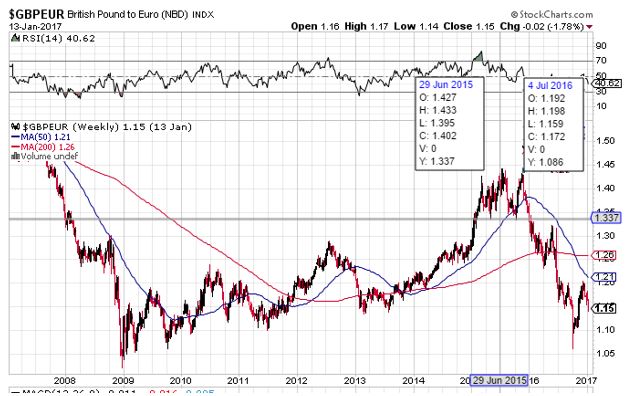Bad timing can be good timing. Let’s talk about bad timing first. Look at the chart below of the British pound versus the euro on the two boxed dates, June 29, 2015 and July 4, 2016. Between those two dates, the British pound fell 16.4% against the euro on a closing basis. Playtech booked its last midyear results on June 30th 2016, one week after the Brexit vote crushed the pound. Playtech holds its cash primarily in pounds sterling. The result was that its earnings were crushed badly.
 From H1 2015 to H1 2016, revenues were up 18% but net profit fell 31%. Had the pound not crashed, profit would have been up 54% constant currency. Had the Brexit vote taken place one month later, Playtech would likely have reported much better bottom line results last June.
From H1 2015 to H1 2016, revenues were up 18% but net profit fell 31%. Had the pound not crashed, profit would have been up 54% constant currency. Had the Brexit vote taken place one month later, Playtech would likely have reported much better bottom line results last June.
But it’s also good timing, because the pound will come back up. It hasn’t yet, which means Playtech’s next earnings report won’t get that huge boost coming to it when the pound recovers, giving investors more time to get in. The stock hasn’t moved that much on net from June to June and still hasn’t, which means the company’s shareholders understand the artificial nature of its earnings fall. But even so, when the pound reverses and those bottom line numbers look inflated, it will probably attract extra buying from traders/algorithms looking for impressive earnings results, as artificial as they may be. Another way of looking at it is if Playtech shares can withstand such a hit to earnings, we’re looking at a fundamentally strong company.
A rising pound is an extra plus for Playtech because Eurozone business will be hurt by the next episode, but a rising pound should mask some of that damage, which will make Playtech look relatively stable in stormy seas. That should attract more institutional investment looking for safer plays, not to mention that Playtech pays a nice dividend as well at about a 7% yield at current prices, counting recent special dividends. This kind of payoff and relatively stable looking chart is going to attract capital in its own right from technical traders who know little about the gaming industry.
But why will the pound go back up against the Euro? Two reasons. First, because when dealing with systemic instability, the Eurozone is far more infected than the United Kingdom. The Eurozone is still a series of crises just waiting to happen, probably this year too, while with the UK the “crisis” already happened when Brexit technically passed. If and when the Eurozone is in its next sovereign debt showdown, the UK will look insulated by comparison and Britons will suddenly look like geniuses for voting Brexit, whether or not the process actually happens. Second, with Trump threatening Germany with trade barriers because their cars are better and bankrupt Detroit can’t compete, this will likely strengthen economic ties between the UK and the rest of the European Union even in the face of an actual Brexit. Trump will serve as a common economic enemy that will give Britain better trade terms with the EU.
Will Trump go through with his tariff mania? Today’s move by General Motors announcing a $1 billion investment in American factories says yes. GM wouldn’t announce such a big move if they weren’t fairly certain they’d get protection from Trump.
 As for the company itself, Playtech looks pretty healthy. Debt is tiny at only 18% of market cap, this despite recent acquisitions that are growing the company, paid for in cash. Playtech’s biggest growth segment is its strongest, with casino growing 19% from H1 2015 to 2016. Its failures are minor with falls only in its two least significant sectors of poker and bingo. This could be seen as not so great for the sake of diversification, but Playtech has diversified in other ways, most notably in terms of customer distribution. The top 5 clients accounted for 45% of revenues in 2014, down to 39% in 2016. The top 15 accounted for 77% of revenues in 2014, and 70% now. It’s more important to diversify within your sector of expertise than to put too many resources in other sectors that would be nice to have a slice of, but may cost too much to really compete in.
As for the company itself, Playtech looks pretty healthy. Debt is tiny at only 18% of market cap, this despite recent acquisitions that are growing the company, paid for in cash. Playtech’s biggest growth segment is its strongest, with casino growing 19% from H1 2015 to 2016. Its failures are minor with falls only in its two least significant sectors of poker and bingo. This could be seen as not so great for the sake of diversification, but Playtech has diversified in other ways, most notably in terms of customer distribution. The top 5 clients accounted for 45% of revenues in 2014, down to 39% in 2016. The top 15 accounted for 77% of revenues in 2014, and 70% now. It’s more important to diversify within your sector of expertise than to put too many resources in other sectors that would be nice to have a slice of, but may cost too much to really compete in.
Playtech has also gotten into the CFD business, similar to options but less regulated, a good and more stable replacement for its shady binary options business that tries to sucker in novice and unsuspecting get-rich-quick nebachs (unfortunate people) who think they can time currency movements by the hour. CFD revenues are up 124% in active customers, and 60% in new depositors.
The dangers for Playtech are there, but less obvious and not that pressing. First, regulated revenues are still only 39%, which is dangerous, but Playtech claims those numbers will improve in the coming quarters. Second, a Philippines license accounts for the largest chunk of its revenues. This doesn’t mean that it’s relying on Filipino markets, but it is relying on the relative stability of its regulatory regime. Under Rodrigo Duterte, that can’t be totally assured. He could decide one day that foreign gambling companies are bad and go after licensed companies. Who knows. These are just things to watch out for rather than imminent dangers though.
All considered, Playtech looks like a decent income buy and hold for the medium to long term given the high dividend and stability in its shares, to be checked on every so often but not to be particularly worried about. Good finances, evolving business strategy, stable clients, and in a good place in terms of currency markets.